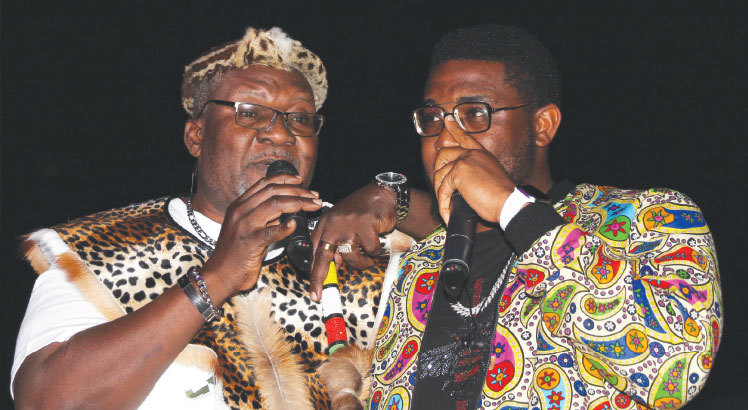Throughout his illustrious career, ‘Soldier’ Lucius Banda has written songs inspired by personal experiences.
His arrest years ago, birthed one of his best compositions yet, Johnny. The song was a typical address to his son Johnny Zembani.
In the song, he narrates his ordeal, in this case his arrest by the people whom he had previously fought for.
The same arrest also inspired his album, Cell 51, titled after the cell that he occupied during his incarceration at Zomba Central Prison.
It has not just been adversity that has excited his creative mind. Many times he has drawn the listener to lessons that life has delivered to him such as in Nthawi, which probably is one of his greatest compositions to date.
Sometimes the inspiration has come from as close as his homestead. In Limbikira Mwanawe, an epistle to his son Mapiri Bakili and daughter Laura Namthengo, ‘Soldier’ reminds them that what he has is not theirs. They need to toil on their own to create their own wealth.
On December 3, ‘Soldier’ released Love and Hate, which he calls his last studio album. In the 18-track album, he has plenty of inspiration to draw from such as politics and personal experiences.
‘Soldier’ has a couple of times fallen victim to the unfortunate rumours that he has died. It is something he feels strongly about.
“It looks like with the coming of social media, most Malawians have fallen into the temptation of being a journalist yet they have never been in a journalism class. They have this hunger of breaking news as if they will be paid for it.
“When there is nothing to break, they create stories. They don’t even consider how the relatives will react to that. As Malawians, we can do without that. It is not necessary,” he said.
In his masterly, the singer and composer has provided a perfect response to the irresponsible minds who are always in the forefront of churning out such falsehoods.
In the song Mzele wa imfa, Lucius reminds everyone that the day and date of someone’s death is a prerogative of the maker and not anyone else. He states that death is a debt every one of us will have to pay.
“Pa mzele wa imfa palibe ochenjera, musamayankhule momaliza kumabweza. Wodwala kukhala wina, otsogola kukhala wina. Imeneyo ndiye imfa, khala chete. Zofunika kukonzeka katundu waulendo, poti ulendo ndi otsimikizika langotsala ndi tsiku…
“Njira ya imfa cha moyo chidzayidutsa, kumangopanga ubale ndi Yesuyo…” he sings in the song.
The theme is also present in the last song of the album Dzina La Yesu. The singer outlines some of the challenges that life has thrown at him such as death and ailment. Both, he says have reaffirmed his belief in God and there is no turning back for him.
Ahead of the release of Love and Hate, particular interest was on how Lucius would touch on the thorny political issues given that he is part of the Tonse Alliance administration where he is serving as adviser to President Lazarus Chakwera.
The question was whether he would avoid biting the finger that is feeding him by burying the numerous issues bedeviling the political and administrative landscape under the carpet.
During a preview of the album, weeks to its release, journalist and art critic Mzati Nkolokosa said it would be tough for Lucius to rise above his political trappings to objectively tackle the contentious political issues in the album.
“It is almost impossible to reclaim his spot as a Soldier of the poor,” he said.
His response to such pessimism would not have been greater. In Kalata ya Chisanu, ‘Soldier’ outlines the problems that have rocked the current administration, with corruption being the worse vice.
He goes on to remind how people laboured to have the Tonse Alliance get into power through endless efforts. He reminds the leaders, who rallied behind them during demonstrations, that they owe them a better Malawi, failing which will be betrayal.
The presentation of the song is systematic. While admitting to the failures of the current administration, he also firmly gives a subtle indication that it is not all because of the Tonse Alliance, but due to the mess left by the previous government.
The title track Love and Hate is another piece laden with political narrative which doesn’t caress the Tonse Alliance government. He does not hold any prisoners, but says things as they are regardless of his current political leanings.
One factor that has kept Lucius relevant in the industry despite his long years in the game has been his ability to mingle and mix with artists from across the board. He has featured with musicians from all ages and with different styles.
He has kept the tradition with a feature with dancehall artist Malinga on the song Thamangani. There are two more features too. A first one with his son Johnny on Wandilira. A reggae tune that seems to mock his detractors.
There is also a collaboration with Dan Lu on the song Iye ndi Ine. Other songs in the album include Bisa, Lisa, Moyo wa Msilikali, Sungeni and Ernest and Malingunde. All in all, Love and Hate provides a window for Banda to communicate from his inner heart.
The post ‘Soldier’ meets self in love and hate appeared first on The Nation Online.
 Moni Malawi
Moni Malawi 
